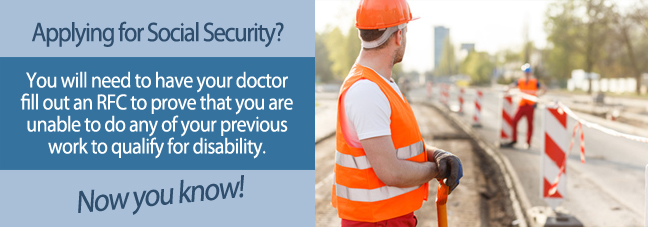If your disability application is initially denied, and you’re facing an appeal hearing, then you’ll need to prove your medical condition stops you from doing the same kind of work you did in the past.
You must also however prove you’re unable to get any other job for which your work experience, skills, training, and education would make you qualified. Establishing these arguments and winning a disability claim will take some time and work, but it is worth it in the long run to achieve the disability approval you need.
The Residual Functional Capacity Evaluation
When an applicant doesn’t qualify through the Social Security Administration’s (SSA’s) Blue Book, a residual functional capacity (RFC) evaluation is required. During an RFC, the SSA examines your everyday limits, including how your disability stops you from completing normal activities, like household tasks, running errands, or even things like preparing food or bathing.

How Your RFC Affects Eligibility
An RFC may initially seem odd, since it asks questions about your personal life instead of how your medical condition affects your ability to work. However, everyday activities (such as activities of daily living) require similar mental and physical abilities to common job functions.
Through an RFC, the SSA can therefore potentially see how your disability limits or stops you from being able to perform not only everyday tasks but essential job duties too.
Filing an Appeal and Preparing for the Hearing
If you’re denied benefits after an RFC, then the disability examiner that reviewed your application wasn’t able to clearly establish that you can’t perform similar work to what you did in the past. That means you’ll need to make a stronger and clearer argument at the appeal hearing in order to win your disability case.
An administrative law judge will preside at your hearing, and you must convince him or her that you’re in fact disabled according to the SSA’s definition of disability. This can be challenging, especially since the judge will likely call a vocational expert to testify at your hearing.
This expert’s job is to provide an opinion on the kinds of jobs you can do, given your physical and/or mental limitations. To be approved for disability, you must show you’re unable to work in any job. To achieve this, the vocational expert must be forced to examine all of your limitations and must then state that there is no job you're qualified to do that you can still hold.
Representation at Your Appeal Hearing
A vocational expert’s testimony can end your disability claim, if left unchallenged. While you can perform a cross-examination yourself, an advocate or disability attorney is likely your best bet for successfully countering a vocational expert’s opinions.
An attorney knows how testimony is structured and the right questions to ask during cross-examination in order to rule out all the employment options a vocational expert may present. In other words, a disability advocate or attorney can help you prove you’re unable to do the same kind of work you did in the past and that you’re not capable of holding any other job either.
These are essential arguments that must be won for you to be approved for disability benefits at an appeal hearing.